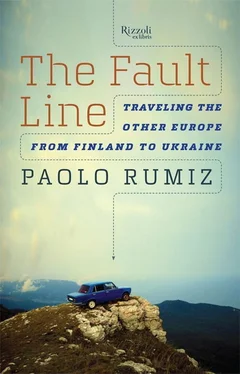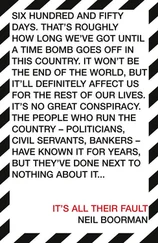From Norway south, I haven’t found any nations, only a slow transcoloration that is oblivious to borders and their ridiculous barriers. Poles in Ukraine, Jews in Belarus, Finns in Russia, and Russians in Latvia. The peoples of the frontier always surprised me; they never conformed to cliché, and they were always distant from the political and administrative centers of their countries. They did not echo Italians in saying “Moscow’s a thief,” but they weren’t far from it.
Everywhere I went, I found relics of the moving frontiers of past empires—Russian, German, Ottoman, and Austro-Hungarian—abandoned like erratic blocks in the middle of the Alpine foothills. In Ukraine, I saw a golden Madonna shining atop an ex-minaret. In the Carpathians, I came across tombs of soldiers from Trieste—my hometown—who from 1914 to 1917 had fought in the war for Austria against the czar; in Poland, castles built by Teutonic Knights; and in Belarus, titanic monuments to Stalin.
Do I want to go back home? Not in the least. And I know perfectly well why not. Every time I’ve reentered the EU during this zigzag down the zipper of Europe, I’ve felt disoriented and I’ve asked myself, What am I doing here? Crossing the border into Estonia or Poland, I had a burning sensation: to the west, my adventure would be over, the scribblings in my notebook were bound to wither away, and the air was tainted by that unmistakable blend of saccharine Catholic respectability and obsessive Protestant “busyness” that poisons my world. I felt an immediate distaste for its moralism, its pharmaceutical cleanliness, its annoying flowers on the windowsills, and its unjustified presumption of innocence. And its conviction that it is the brain and nerve center of a political space capable of self-control, and not its stomach, susceptible to bellyaches of the most banal origin.
In the East, things were better. More brotherhood, communication, curiosity. Primordial landscapes, more sacred places. On its western border, my frontier displayed the heavy impact of this closeness. It had a Slavic soul, the spirit of a great people that has suffered and loved. Throughout my entire itinerary, the lingua franca was Russian, and saying spasibo (“thank you”) always worked. Just one Ukrainian ticket seller, at the train station in Uzhgorod, not far from the Hungarian border, barked at me that she was not required to speak the fucking language of her ex-masters, so I answered her unperturbed in English, soliciting an even more ferocious response. Russians, Ukrainians, Belarusians, the difference among them as far as I was concerned was like the difference between Serbs and Croats, sworn enemies whom Miroslav Krleža has ironically defined as “Shit from the same cow pie, cut in two by the wagon wheels of history.”
“Look at this land, isn’t it wonderful?” a Ukrainian peasant woman asked me one evening in front of an ocean of grain, swaying in the wind. “It could feed the whole of Europe,” I commented. To which she, as though talking to herself, said, “Then why are we so poor? Why do millions of us emigrate? Why is there so much uncultivated land? Why do so many of our women go to Italy to take care of your old people?” Then, after a long silence, “I’ll tell you why: we’re governed by bandits. And you, over there in Italy, do you have bandits in power, too?” I avoided the question.
This journey to the East has been a bath of humanity. More than any other, this has been a journey made not by me but by the people I’ve met. Put another way, the journey has made itself, without any regard for my expectations. Maybe it worked because I didn’t know very much before I left, and perhaps the most successful journeys are the ones you don’t have enough time to plan. The ones you set out on without the ballast of a ton of books. Lightly. Carrying nothing except the experience of your previous wanderings.
Initially, I thought I would go as far as Cyprus, skimming past Turkey along the Greek islands that dot its shoreline, and maybe even go on to Alexandria, inhabited up to just the other day by Greeks, Jews, Italians, and the French. Now I realize I’ve already seen too much. I’ve skinned the Russian bear, filled seven eighty-page notebooks, and what I’ve seen is more than enough. I’m saturated.
Seven notebooks and a series of accompanying drawings, to better fix details and landscapes in my memory, all gathered in a blue cardboard folder. I’ve patiently reproduced the labels of Eastern beers, bilingual signs, multicolored train tickets, trapezoidal antique maps. I can’t go any farther. Odessa is a perfect terminus. I know almost nothing about this place, but I can feel that it contains within itself my entire journey. The road home starts here, on the shore of the Black Sea.
Mediterranean sunlight. We’re anxious to plunge into the water to wash away ten countries’ worth of dirt, and getting to the beach in Odessa is really easy. Just follow the stream of pedestrians carrying beach bags. I walk down through a grove of acacia trees, pass by stands of dried fish, baskets of ruby-red shrimp, and dusky-brown sole hanging on a line, and end up on the cleanest and most civil free swimming area I’ve ever seen. A populace of two million Russians and Ukrainians comes to the sea here, without invading one another’s personal space, without strutting about to show off new swimsuits or sunglasses, without littering, without bickering, without screaming spoiled brats, and without playing deafeningly loud music. “It’s like this because the rich, arrogant Russians are at the seaside in Italy,” laughs to my amazement a still attractive seventyish woman with a glitzy red rose in her hair.
I dive in against the wind. The water is only slightly salty and vaguely oily.
The sun is scorching hot, and in just two hours, I’m on the verge of a severe sunburn. Out at sea, way out at sea, a dozen or so containerships look as though they’re already lined up for the Bosporus. Around eleven o’clock, the wind whips up from the south and, backlit by the sun, the water turns the color of pewter.
Off in the distance, I can see some agitated movement down on the pier: a platoon of diving cormorants has signaled the presence of a school of sardines.
There they are, wrinkling the surface like a light sunset breeze. Everyone has seen them, the fishing lines are already whizzing this way, without breaking the perfect silence. I’m surrounded by people it seems I’ve known forever. I sit down in the shade to write, at an outdoor table of a bar. I’m joined by a pearly-headed Cyrillic beer, and the story begins.

1. BOREAS
JUNE 2008, SIX A.M. The last bus in Europe is heading north through Finland toward Lake Inari, chugging its way through an immense landscape of water, stone, snow, and forests. Its ultimate destination is Kirkenes, the last piece of Norway before the Russian border, where my long descent south will begin. It’s cold, in defiance of the season, and there is an air of funereal melancholy on board. Finns don’t talk much, and they smile even less. The people of the woodlands live in terror that someone will smile at them, because in that ill-fated case, their code of good manners obliges them to come out of their cocoon and respond to the signal.
A ceiling of heavy clouds. No longer the cauliflower and bulging dragons of my latitudes, but banks of bloated herring, gashes in their flesh, ulcerating wounds, ash-colored tumefactions still warm and pulsing with flashes of orange light. No mountains: the landscape looks as though it has been planed by some planetary carpenter. The sunlight in Helsinki? It’s already a dream, as is the Mediterranean. The Baltic? The tropics by comparison.
Читать дальше













